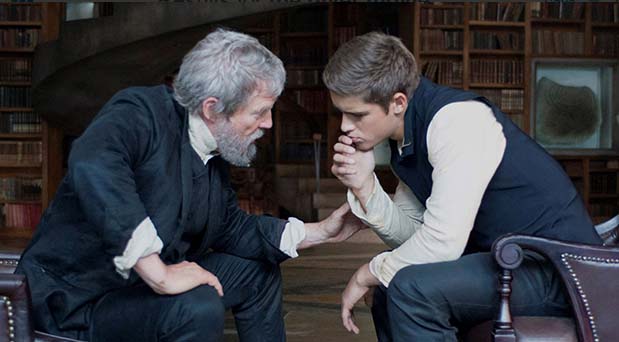The Era of YA Dystopian Novels Is Ending: 7 Things Readers Will Miss

1. Parkour
It seems pretty unlikely that the future Hazel and Gus characters in the next Fault in Our Stars imitation will be scaling walls or jumping from trains. But in YA dystopian fiction, everyone seems to pretty much be born with the parkour skills needed to escape from the authorities, whether it's the Population Police in Margaret Peterson Haddix’s Shadow Children series or the Creators in The Maze Runner series.
SEE ALSO: Film Review: 'The Giver'
2. Re-imagined Cities
In all honesty, it seems kind of fun to live in the vast wastelands of the future: crumbling cities, underground cities, and walls. Walls everywhere. While that doesn’t seem like anyone’s choice of playground, dystopian novelists certainly took you on adventures through the ruins of some of our beloved cities. From the Chicago portrayed in Divergent to the New York City in All These Things I’ve Done, ruined cities seem to be the popular trend in these novels.
3. New Names
We got the first chance to meet the characters that will inspire a future generation of Four’s (Divergent) and Doon’s (City of Embers) and Nailer’s (Shipbreaker). Maybe parents will pick out names like Ender’s (Ender’s Game) and Finnick’s (Hunger Games). And you think I’m kidding. In the next few years, there might be little Katniss’ in kindergarten classes. The name of the popular bow-and-arrow-sporting heroine was the 14th most viewed baby name on Nameberry in 2013, according to The Guardian.
SEE ALSO: Film Review: 'The Hunger Games: Catching Fire'
4. Divided Society
When we felt a little disillusioned with the divisions of race and class in our own world, we could escape to the dystopian worlds where society was segregated by even less arbitrary qualities. Case in point: the Uglies, Pretties, Middle-Pretties, and Crumblies. Also, the factions in Divergent were basically smart people, nice people, happy people, brutally honest people, and daredevil people. Sometimes, it made you wonder which group you would belong to, and whether you would fit in better in those fictional, divided worlds than you do in today’s world.
5. Technology That You’re Pretty Sure Is Already Possible
You’re not the only one who has wanted a hoverboard or a dress that lights on fire or a camping device that turns your urine into drinkable water. Don’t they have those already?
6. Teenagers Required to Do Impossible Things
Kids just thirteen to seventeen years old are expected to make life-changing decisions and overturn a government, and for the teenager in everyone, that’s still kind of a thrill. While we readers try to figure out what to do with our real lives, we could lead a revolution, scrape out an existence in the wild, and possibly go ziplining over Chicago. Really, the choice of adrenaline is yours.
7. The Reassurance That We’ll Never Get to That Point
Finally, after an exhausting day of everyday struggle in dystopia, we get up from our reading armchair and realize that a future like that is almost unthinkable. But would we even realize when our society rids itself of war that it has become something much more oppressive? Well, judging from the billions of dystopian novels that have sold in the recent craze in the past ten years, at least one of us readers will recognize dystopia when we see it.
Contact Staff Reporter Meghan Coyle here.



